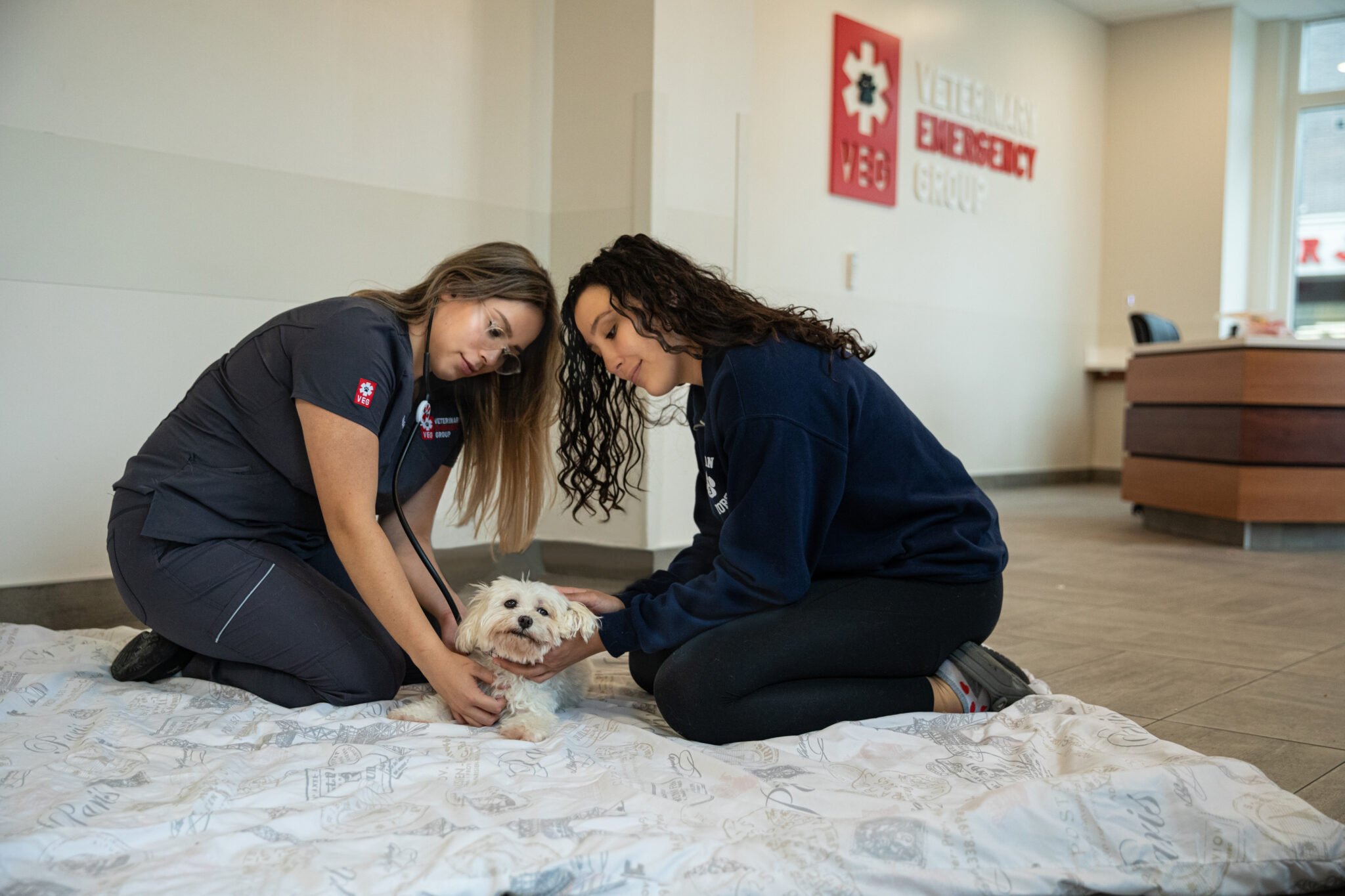
6 Reasons Your Dog is Shaking and How to Help Them
Dr. Savanna Gephard
Call & Speak with a doctor Open 24/7, Even Holidays!
Walk in today for:
Emergencies
Point-of-Care Ultrasound
Urgent Care
X-Rays
Diagnostics + Testing
End-of-Life Care
Surgery
Treatment + Hospitalization
If your dog is shaking, you might be worried and want to know why. This can be a sign of anxiety, feeling cold, or could be a sign that there is something wrong with your pet’s health.Some breeds of dogs naturally shake more than others, adding to the confusion that owners have about shaking in dogs.
Main Reasons Why Your Dog Is Shaking
While you might not be sure of the reasons that your dog is shaking, it can be important to know the difference between anxiety and shaking, which is related to things like pain. You will need to pay attention to your pet’s behavior if you think that they are not acting like they normally do. Shaking can be a sign of bigger issues, and you will be able to spot other symptoms in most cases once you start watching your pet closely.
Listed below are the main 6 reasons why your dog is doing this:
1. Cold
Dogs can get cold, just like people, despite their fur coats. Animals that are outside too long in the cold can start to shiver if they are not able to get inside to warm up. Smaller dogs are more susceptible to becoming chilled in the cold than big dogs, but any size dog can get too cold if they are outside when the temperatures are not very high. Dogs can wear jackets and dog booties when they go outside in the snow or the cold to play, but they should never be left outdoors long-term when the weather is quite cold.
2. Pain
Dogs that are in pain can shake as an expression of the discomfort that they are in. These animals might also be lethargic, act disinterested in food or water, and seem to generally just not feel well. You will need to consider taking your pet to see your veterinarian right away when they stop eating and drinking, even if the shaking is mild.
3. Fever
Dogs can get fevers just like people. Some illnesses or even some pain conditions can lead to a fever that can make your dog feel chilled and thus start to shiver. Usually, only very high fevers cause shivering in dogs, so this is often a warning sign of a major problem that might need emergency attention from a vet.
4. Stress or Fear and Anxiety
Dogs that are stressed, scared, or anxious can shake as well. This can be related to a change of scenery, moving to a new place, or even meeting new animals at the dog park. Dogs that are fearful by nature might shake often, but that does not mean that this kind of shaking is a sign of a medical condition. You can still take your dog to the vet for help with their anxiety, as they are some medications that can keep animals from being so upset when their environment changes.
5. Excitement
Dogs can also shake when they are very excited. This is more common in dogs that are hunting dogs, but it can happen to any dog that is excited. The more intense a dog’s excitement, often the more intense their shaking. This can make people think that their pet is sick when in reality, they just need to be allowed to release some of their nervous energy through play or exercise.
6. Old Age
Some dogs will develop tremors or weakness as they age. This can be related to weakening joints, arthritic pain, or even just general old age. Your vet can help you to assess and treat the symptoms of old age, but tremors can be part of the aging process for some dogs. Certain breeds are more prone to this symptom than others as well, meaning that you might need to expect this to be part of your dog’s aging process, depending upon their breed.
What to do About Shaking in Dogs
If your dog is shaking, you might not be sure what to do for them. In most cases, a trip to the vet is a good idea, just to rule out health conditions that might be causing your dog to be in pain or feel anxious. If your dog is shaking from excitement only, exercise and proper management of its environment can make a big impact on this behavior. Fearful or high-drive animals might also benefit from some medication provided by a vet to help with their anxious feelings.
Shaking can also be a precursor to more serious conditions that have to do with seizures, so you could need to have your vet look at your dog to be sure that the shaking that you are seeing is not a warning sign of seizures. If your pet ever becomes unconscious, you’re unable to get their attention while they are shaking, or starts to have other signs like vomiting, diarrhea, or urinates themselves, please contact a veterinarian as it may be a more serious condition that needs prompt treatment.
Contact VEG if Your Dog is Shaking
Shaking in dogs can be caused by many different things. While excitement and anxiety can be the reason for your dog’s shaking, you should never assume that your dog is not in pain or that they are not experiencing other kinds of health conditions, so contacting a veterinarian can assist you in differentiating between the two and if you should seek treatment.
Even if your dog is just anxious or worried, seeking treatment for their anxiety with your primary care veterinarian can make a big impact on their overall health. Your veterinarian can provide you with the tools to help calm down a dog that is worrying about a change to their routine or a change in their environment. Dog trainers can also assist you with issues related to anxiety or fear and help your dog to overcome them.
Dog shaking can be caused by a variety of different things, but no matter the reason for your dog’s shaking behavior, you will want to ensure that you pay attention to the issue and seek a resolution. Contact your nearest VEG location if you have any questions about your dog shaking. You will always speak directly to a qualified veterinarian.

